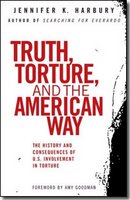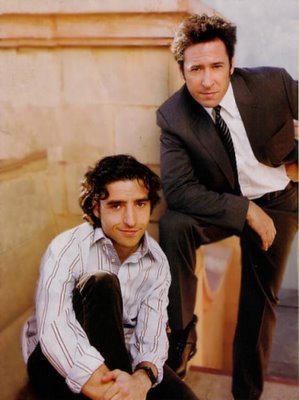 Having just read Truth, Torture, and the American Way, I don't think it was particularly instructive. Most of the material detailed in the book wasn't new to me. In an exceptionally well-taught International Relations class my senior year of high school, I learned all about the Nicaragua-contra affair, the Sandinistas, and involvement in El Salvador, Guatemala, and the Honduras. Although cases of torture weren't on the syllabus, it's logical that extreme violence and heavy crackdowns on the civilian population would involve torture of some sort.
Having just read Truth, Torture, and the American Way, I don't think it was particularly instructive. Most of the material detailed in the book wasn't new to me. In an exceptionally well-taught International Relations class my senior year of high school, I learned all about the Nicaragua-contra affair, the Sandinistas, and involvement in El Salvador, Guatemala, and the Honduras. Although cases of torture weren't on the syllabus, it's logical that extreme violence and heavy crackdowns on the civilian population would involve torture of some sort.What really strikes me about this book is the lack of information about what really happened in Central America and now, what's happening in Iraq. I couldn't tell you if torture is effective or not, and I doubt that any civilian or most military officials could, either. However, if torture is ineffective, then why bother with the costs and potential social reprecussions? I agree with Harbury that it must lie somewhere between the effective and the ineffective.
I also feel conflicted about the book because I have always been enamored with the governmental agency that Harbury denounces so harshly in her book. It's likely that only a small percentage of its employees were directly involved in the horrors mentioned in the book. Whether more people knew what was really going on is debatable. On the one hand, it's horrible to stand there and know that atrocities are being committed without doing anything. However, most people aren't superheros or passionate enough to risk their jobs and families to expose something that the president and top state officials endorsed.
There are two types of people, leaders and followers. We don't really worry about the independent thinkers because we're talking about large-scale government actions and agencies consisting of tens of thousands of people. It's difficult to decide how much blame to put on people who follow orders. I'm not saying that following orders blindly automatically excuses someone from prosecution, or that leaders are granted automatic carte blanches, but that the situation is more complicated then Harbury outlines in her book. As a human rights activist and the wife of a famous victim of torture, I can see why she wants everyone, from the top of the chain of command to the bottom of the chain of command, to be punished severely.
Harbury notes that the MPs that were punished for the Abu Gharib were simply following orders from the higher-ups and really weren't the officers responsible for creating and masterminding the entire operation. However, she also maintains that the harsh reprecussions meted out to these soldiers were beneficial because more soldiers now questioned their COs. She also claims that the judicial system is best for dealing with individuals and organizations that have violated human rights violations, citing the Nuremburg trials as an effective example. Of course, we now know that most major Nazi leaders had escaped Germany and were not tried at the Nuremburg trials, including the infamous abduction and subsequent trial of Adolf Eichmann.
In a perfect world, I would be inclined to agree with Harbury that the justice system should deal with individuals accused of human rights violations. Given the state of our justice system, the mere time for cases to come to trial, frequent mistrials and other problems, this is not a viable solution. Harbury offers the FBI as a prime example of a well-functioning agency that is humane because its employees are subject to law and can be prosecuted for wrongdoing. While that may be her opinion, the FBI hasn't exactly been hailed as a stellar agency following a reassessment of events in Waco and the failure to process information leading to 9/11.
Nor is it realistic to prosecute everyone from the president downwards, as Harbury is suggesting that we do. Torture has been used for so long that it's not going to disappear, and given current conditions, it's unlikely that anything will change.







